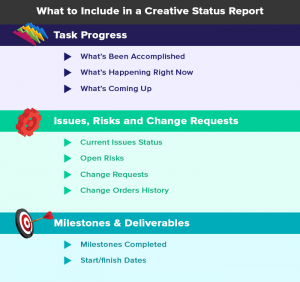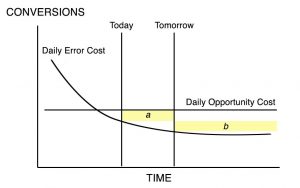Ensure every campaign you launch has the highest chance of success by making one simple shift in how you approach your marketing.
How incredible would it be if every marketing activity you pursued and invested in, delivered exactly the results you hoped for and more?
Nothing in marketing is certain — and it constantly changes — which can make it hard to project and predict the outcomes of our efforts.
Fortunately, there’s a simple process you can use to dramatically increase the odds that your marketing is successful.
Here’s how to guarantee your marketing wins every time.
Are you throwing away your marketing budget?
Marketing is often seen as a gamble: “Will this work? Who knows! Let’s try it and find out.”
Some marketers look to historical performance or their competition as validation, claiming, “This has always worked for us in the past.” Or “If the competition is doing this, it must work!”
As a result, marketing organizations waste millions of dollars a year on crazy, stupid and genius ideas alike. In fact, most marketing efforts fail to deliver on expectations, results and revenue.
When any marketing initiative falls short, there are three big areas of waste.
Budget
Marketing isn’t cheap. Many campaigns require significant investments. Failing to achieve a positive ROI doesn’t only negatively impact the balance sheet — it makes it harder to negotiate for more budget in the future.
Effort
Capacity is one of the biggest challenges for marketing teams and having them spend effort on marketing that doesn’t deliver results is a huge opportunity cost.
Time
The time invested in executing marketing is a sunk cost. You can’t get it back and it’s often the most expensive investment.
Marketing doesn’t have to be a guessing game. You can ensure that every campaign you launch and every dollar you spend has the highest chance of success by making one simple shift in how you approach your marketing.
How to guarantee your marketing wins every time
Measure twice, cut once
You’ve heard the age-old adage before: measure twice, cut once.
Many marketing teams forget this — or ignore it — because they are overwhelmed and rushed to finalize the copy, finish the assets and launch the campaign.
Before launching a campaign (or any other marketing initiative), there is one crucial step that most marketing teams skip, ignore or aren’t even aware of: validation.
Validation is the most valuable and most under-utilized process across all of the global marketing teams I’ve worked with. The most successful marketing teams validate their marketing before investing significant amounts of time, effort and budget.
Validation is a concept that’s commonplace in the startup world where, before launching a new business, you gather feedback from prospective customers to gauge the level of interest and expected response.
And you can do the same thing with your marketing. And you should, because:
- It’s inexpensive, fast and easy to do.
- It will save you tons of time, money and effort.
- The smartest companies in the world do it all the time.
Here are some practical examples of how you can validate your marketing.
The crazy (and true) story about TripAdvisor
I love traveling, so naturally, I’m a huge fan of TripAdvisor — one of the largest travel sites in the world. And their approach to validation is so simple, completely insane and absolutely genius.
Here’s how it works.
If TripAdvisor wants to add a new section or feature to their website, they don’t jump in and start building it. Instead, they add a link on the website for the new page… but the link goes nowhere.
In fact, if you click the link, it will show an error in your browser.
Then they wait and see how many people click the link.
If a lot of people click it? Great! People seem interested, so let’s build that part of the website.
If only a few people clicked it? I guess it wasn’t that great of an idea and people don’t seem to care, so let’s not build that part of the website.
You’re probably thinking the same thing I did when I first heard this…
Why would you add a broken link to your site that shows an error when people click it?!
TripAdvisor tested this and found out that when a person sees that error page, they assume it was a problem on their end — their internet or their computer — not a problem with the TripAdvisor website. So there’s no negative impact to TripAdvisor, yet they still gain valuable insight into what people are interested in.
Pure genius.
TripAdvisor CEO Stephen Kaufer says it “solves umpteen meetings worth of powerful debate and logical arguments” about what to build and what not to build.
If TripAdvisor can do it, so can you. Here are the simple steps you can use to validate your marketing.
3 steps to validate your marketing
The point of validation is to get feedback quickly, iterate and gain confidence in the expected outcome and results. There are only three steps and they’re all easy to do and don’t require much time or money.
Here are the steps to validate your marketing:
Step 1: Ask
If you want feedback, you have to ask someone. It’s easiest to ask your ideal customers what they think, but people are people, so don’t worry if you can’t access your ideal customers. Talk to strangers, corner your colleagues or ask your spouse.
You can email your list, post on social media, run a survey or even spend some money on paid advertising to get feedback. It doesn’t matter who or how you ask; what matters is that you create a series of questions and that you ask people them.
What you ask will depend on what you’re validating. The best way to come up with powerful questions is to imagine the possible responses you might get and how you would use them to inform your marketing.
Step 2: Measure
Once you’ve found some people and asked them your questions, it’s time to review the responses.
- Did people respond positively or negatively?
- What did they say?
- What were the common patterns that emerged?
- What were the high and low points made?
- Were there any red flags that need to be addressed?
It’s usually best to analyze the responses and then have a group discussion to see what insights you can mine from them.
Dig deeper: How marketers can measure success
Step 3: Decide
Now that you have some observations and insights, it’s time to decide what to do about them. How should you adjust your approach? What should be added, changed or removed?
It’s rare that you need to scrap an entire campaign, but I’ve seen it happen before. Often times this step is more about refinement and small changes that will push the creative, copy or campaign in the right direction.
Making your marketing foolproof
Validation is the key to guaranteeing the success of your marketing. By involving your audience before investing significant time, effort and budget into a campaign, you can avoid costly mistakes, save valuable resources and increase your chances of success.
Before you launch your next big campaign, test the waters with your audience. You’ll be surprised by what you learn and the result will be higher quality and more effective.
The marketing process must begin with validation so that you are constantly getting feedback, learning what works and adjusting accordingly.
The more you test, the more you learn. And the more validation you get, the more revenue and results your marketing will produce.
The post How to guarantee your marketing wins every time appeared first on MarTech.
MarTech(23)
Report Post



